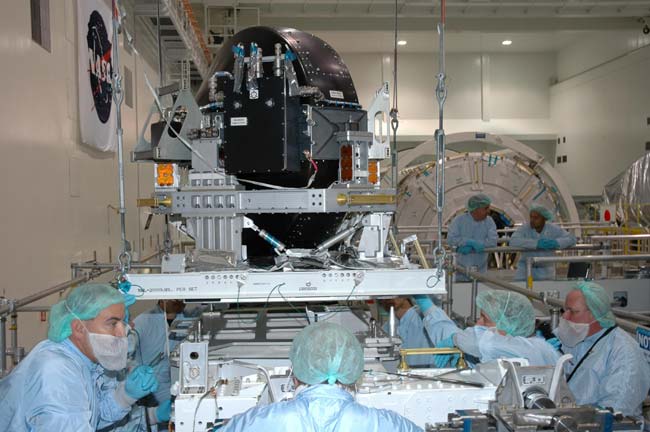No Quick Fix Spacewalk for Disabled ISS Gyroscope

Breaking space news, the latest updates on rocket launches, skywatching events and more!
You are now subscribed
Your newsletter sign-up was successful
Want to add more newsletters?

Delivered daily
Daily Newsletter
Breaking space news, the latest updates on rocket launches, skywatching events and more!

Once a month
Watch This Space
Sign up to our monthly entertainment newsletter to keep up with all our coverage of the latest sci-fi and space movies, tv shows, games and books.

Once a week
Night Sky This Week
Discover this week's must-see night sky events, moon phases, and stunning astrophotos. Sign up for our skywatching newsletter and explore the universe with us!

Twice a month
Strange New Words
Space.com's Sci-Fi Reader's Club. Read a sci-fi short story every month and join a virtual community of fellow science fiction fans!
The currentcrew of the International Space Station (ISS) will not make a special effort to replace a faulty circuit breaker that hobbled one of threegyroscopes used for orientation this week, NASA's ISS program manager saidThursday.
Instead,ISS Expedition 10 commander Leroy Chiao and flight engineer Salizhan Sharipovwill go ahead as planned with a March 28 spacewalk to install antennas andother equipment to the exterior of the space station.
"It willnot impact [the spacewalk] at all," said NASA ISS program manager BillGerstenmaier of the circuit breaker glitch during a teleconference withreporters. "We're perfectly fine with using two control moment gyroscopes forthat EVA."
The spacestation requires a minimum of two functional U.S.-built gyroscopes to maintainits position in space without switching to propellant-driven Russian thrusters.
Gerstenmaiersaid that a known fault with a single transistor within the circuit breaker,known as a Remote Power Control Module (RPCM), apparently caused a power lossan ISS gyroscope Wednesday. The fault is identical to an earlier glitchthat forced Expedition 9 astronauts to make an unplanned spacewalkrepair last year.
"When wemade the change out we knew the transistor had a fault in it and we assumed it couldshow up again [and] we were hoping it wouldn't be the case," Gerstenmaier said."But it looks like it is."
Spacestation officials said they will continue to examine other ISS systems to makesure the circuit breaker is the only failure.
Breaking space news, the latest updates on rocket launches, skywatching events and more!
Aspacewalk for another day
ISSmanagers said the earliest the RPCM could be replaced could be during the nextspace shuttle flight, STS-114, aboard Discovery, since a two astronauts on thatmission are already planning to replace a broken gyroscope. If that fallsthrough, the spacewalk repair could be reset for later this summer, they added.
"Itcertainly is possible and doable," said NASA astronaut Michael Fincke, whospent six months as ISS flight engineer during the Expedition 9 mission andhelped make the initial RPCM fix. "It should go even smoother and faster them."
The RPCMglitch is one of several currently afflicting the space station and its crew,ranging from broken exterior lights to a finicky Russian oxygen generator and abroken toilet, both of which were repaired earlier today by Sharipov.
"The thingsthat are going on at the space station are normal," Fincke said, adding thatExpedition 10's Chiao and Sharipov are doing a fine job of balancing thedemands of maintenance and science aboard the ISS.
Also today,NASA officials released their Implementation Plan for the International SpaceStation Continuing Flight, a 210-page document addressing ISS-related issuesfor the agency's shuttle return-to-flight effort.
"We triedto be as thorough and creative with these things, to look at what's going on atthe station, to keep it operational," Gerstenmaier said.
- Complete Coverage: ISS Expedition 10

Tariq is the award-winning Editor-in-Chief of Space.com and joined the team in 2001. He covers human spaceflight, as well as skywatching and entertainment. He became Space.com's Editor-in-Chief in 2019. Before joining Space.com, Tariq was a staff reporter for The Los Angeles Times covering education and city beats in La Habra, Fullerton and Huntington Beach. He's a recipient of the 2022 Harry Kolcum Award for excellence in space reporting and the 2025 Space Pioneer Award from the National Space Society. He is an Eagle Scout and Space Camp alum with journalism degrees from the USC and NYU. You can find Tariq at Space.com and as the co-host to the This Week In Space podcast on the TWiT network. To see his latest project, you can follow Tariq on Twitter @tariqjmalik.
